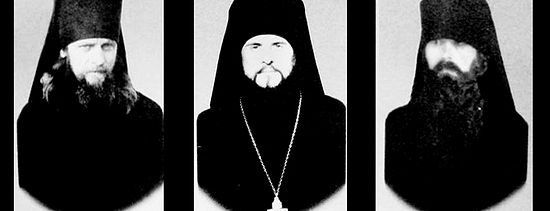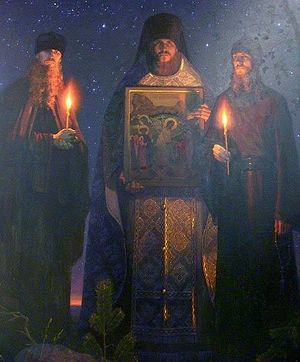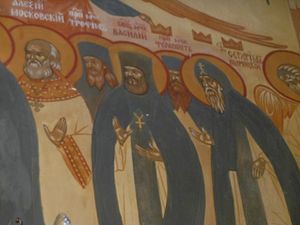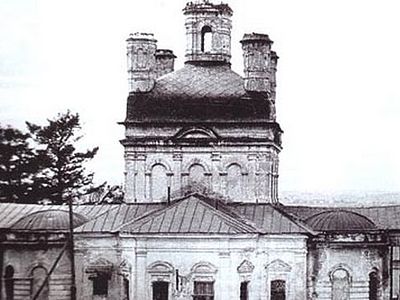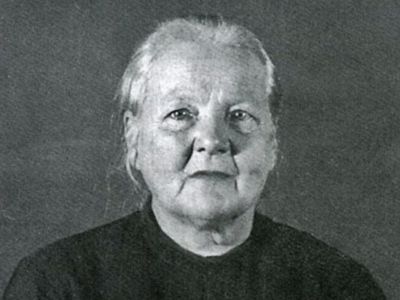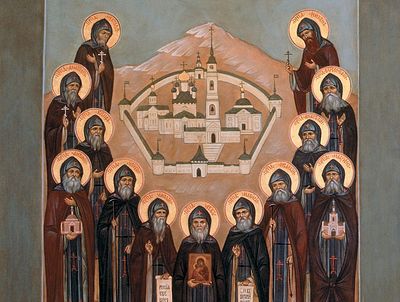November 12/25 marks the commemoration of the righteous monks and laymen buried at Optina Monastery, including the virgin maiden Barbara (1900), the youth George (1994), and the recent martyrs: Hieromonk Basil, Riassaphore-monks Trophimus and Therapontus (1993).
In 1917, the Russian Revolution and the rise of communism resulted in the deaths of millions of believers and destroyed countless churches and monasteries. Optina monastery, once the center of true spirituality for the entire region, was initially spared… but not for long. In 1938 the last Abbot was executed by the communists and the Monastery was shut down. It’s lands were taken by peasant farmers and it’s beautiful cathedral turned into a state museum. It stood silently decaying, awaiting it’s own resurrection. Just before the fall of communism, Optina was returned to the Church, and many of its former starets were glorified officially as Saints. The monastery began to be rebuilt and is flourishing once again today.
Hieromonk Vasily was born Igor Roslyakov. He spent the years after high school working in an automobile factory before entering the Moscow University for Journalism. He recieved a master’s degree in sports and was a qualified newspaper journalist. Later, he married and subsequently divorced with no children. Like many graduates today, though he was academically distinguished, he lacked direction. Modern life seemed to have no purpose. In 1984 he embraced the ancient Christian faith of Russia and began to attend the divine services in the Epiphany Cathedral regularly. His devotion growing daily, he could always be found standing in the same spot in every service, near the Icon of Saint Vasily (Basil the Blessed).
In 1988, Igor moved into the Optina Monastery, which was still in ruins. After he was tonsured a monk and raised to the priesthood he was given the name Vasily, after St Basil. He and the few brothers there began to rebuild Optina and restore the Holy place to its former physical and spiritual glory. Those at the monastery with him can remember tears in his eyes at every Easter service. Many people – pilgrims and monks alike – noticed something special in Fr. Vasily. He became a wise spiritual Father to many, who remembered his deep, otherworldly compassion. Once, some of the faithful asked him, “Father, do you have a special, sacred wish?”
“Yes,” he answered, “I would like to die at Easter, to the chiming of bells.” Everyone knew Father Vasily as a counsellor wise beyond his years, a self-sacrificing priest who would go the extra mile for his spiritual children. He had great faith in God and was devoted to his Saints. What they didn’t expect was for him to receive the death he had wished for.
Leonid Tatarnikov was born in a small village in 1957. As a baby, people thought he was sick because he cried so often. When he was baptized at age two, he stopped immediately, and became healthy. All the local girls loved him as he grew into a handsome youth, and one famously tried to use witchcraft to put a spell on him, telling him, “You’ll be mine or no one else’s!” But Leonid simply ignored girls in general, and concentrated on his studies. He was known never to touch alcohol, instead focusing on learning, earning the nickname “bookworm.”
After college he enrolled in the Red Army. Once his service was complete, Leonid had a variety of odd jobs: sailor, horse breeder, photographer, and even a shoemaker. He studied dance martial arts intensely, once even being offered a contract to be a professional dancer. He could still do the splits without any effort into his thirties. Still, he was empty inside. Soon in his search for answers he began to go to the local church, and on the feast of Pentecost in 1990, Leonid (who now called himself Alexei) finally received an answer to his prayers. He had a vision, and immediately dropped everything to become a monk, buying a one-way ticket to Optina monastery. At the station, his ticket and passport were stolen, but that did not stop him. Using whatever means necessary, including walking most of the distance on foot, he reached the monastery in just a month and a half. At the age of thirty six, he was tonsured and became monk Trofim.
Trofim worked hard at the monastery. After Optina had been shut down by the communist authorities, the farmers tried in vain to get the monastery’s lands to grow anything. When the monks returned to Optina, it began to bear fruit again. Monk Trofim himself would help the local villagers (especially the elderly) plant their potatoes, and they marveled that wherever he had worked the plants were completely healthy. In all the surrounding gardens Colorado beetles infested everything, but where monk Trofim had labored there couldn’t be found even one beetle. Local farmers even came to the monastery asking the monks what prayers Father Trofim had been saying over the gardens, hoping to help their own crops. He worked other obediences, taking on extra work voluntarily. With prayer as his only training, he was an adept bell-ringer, tractor operator, receptionist, house-painter, baker, clerk, and worked in the forge.
The monk Trofim labored in asceticism, eating very little and sleeping even less. Instead, he devoted his hours to prayer, making prostrations before the icon of the Mother of God. In spite of his labor and the harsh treatment of his body, he was never sick, and seemed never to be the least bit tired. For the first and last week of great Lent, it was discovered later, he would eat nothing at all, sustaining himself only through prayer. But somehow near the end of his life he began to walk slowly, and to seem weary when he had never been weary before, as though he knew he was not long for this earth, and there was much to do before the end…
Vladimir Pushkarev was born in 1955 in a blighted village, where most of the men broke their back cutting lumber for pennies, and broke their spirits in poverty, drinking away what little they could earn. No one was baptized, and the nearest church could only be reached from that place by plane, which was impossible to afford. Vladimir attended school, and found his way out of the small town through the Army, where he served beyond the compulsory years. During this time he learned the eastern art of warfare, like the young Leonid Tatarnikov he hardened his body through intense physical training. After his service he worked as a lumberjack in Baikal. He never drank or smoked, and though he was respected, some people considered him a sorcerer because of his natural inclinations toward the spiritual., and the occult nature of the eastern martial arts he was practicing.
While in the forest, an old man appeared to Vladimir in the Taiga and gave him a book about magic. The old man said he would meet Vladimir on the same spot one year later. Though Vladimir didn’t return to meet the old man again, he did perform magical tricks to amuse the local girls. He would send some into the forest and told them to write a note, and would tell them what they had written from a distance. Soon, however, the fun would end, when Vladimir experienced his own death. Through his practice of magic, his soul separated from his body and traveled to a kingdom of terror. Suddenly an Angel appeared before him and offered to send him back, but only if he agreed to go to church afterwards.
After that Vladimir immediately devoted himself to God, moving from that region, where there was no church, to the Rostov-on Don, where he got a job tending the yard at the Cathedral devoted to the birth of the Theotokos. His selfish way of life was completely reversed as he labored and fasted, eating only crackers and prosfora with a little holy water for the entire fast. He began to ravel on holidays all around the region, visiting monasteries and hoping to find one to stay in. He was hired in Kiev and worked cleaning toilets in the cathedral when the Bishop gave his blessing and recommended that he go to Optina.
Vladimir arrived in Optina on foot and was tonsured with the name Ferapont. He quickly devoted himself to his labor, becoming a skilled woodcarver, making crosses for the brothers. In all things, he became devoted to God, crucifying his passions through obedience and prayer. After the monks had finished all the prayers for the day, many noticed that monk Ferapont would continue to pray long into the night. Once, one of the brothers decided to secretly count how many bows he made during the night, but as hard as he tried, he fell asleep long before Father Ferapont finished his prayers.
Once, a man who doubted the existence of God came to the Monastery by accident, and at last he believed. He explained to the Churchwarden, “I saw here how one monk was praying,” he said. “I saw the face of an angel talking with the Lord. Do you know that angels are among you?” “What angels?” asked the surprised warden. The visitor turned and pointed at Monk Ferapont, who had walked out of the Church at that moment. The hierodeacon who lived with Ferapont in the cell related that before the death of Ferapont, he did not sleep at all, praying all the night and only found rest while bending over a chair. Moreover, during all of Passion Week he did not eat a bite.
In 1993, Monks Trofim, Ferapont, and Father Vasily had been fasting with all of the brothers during Passion Week, anticipating Pascha, the glorious service, a celebration of the Resurrection of Christ. In Optina at Pascha there is a procession from the Monastery to the Skete of St. John the Baptist, which is some distance east of the Monastery proper. Over ten thousand pilgrims were present for Pascha. After the Liturgy the monks all went to the refectory to break the fast. After the meal, two of the bell ringers, monks Ferapont and Trofim, returned to the bell tower to continue the Easter peal, ringing for the Resurrection of Christ. At ten past six, the bell ringing became uneven and suddenly stopped completely.
A man named Nikolay Averin, an admitted Satanist, had climbed into the belfry and stabbed monk Ferapont with a knife. He died instantly. Monk Trofim shouted, “God, have mercy on us!” before he too was stabbed. Rising to ring the bell, he yelled, “Help!” and fell down, giving up his spirit. Having committed the murder, Averin slipped the edge of the monks’ robes to their heads and pulled their klobuks over their faces. The murderer quickly fled toward the skete, where Hieromonk Vasily was also going in order to hear confessions. The criminal stabbed him in the back, then climbed over the monastery wall and threw away his self-made knife. According to police, it was double-edged, five centimeters wide, and resembled a sword. It was engraved on its blade with “ 666” and “Satan”.
Averin had stabbed the God-fearing monks, now Martyrs, in the back. According to the investigator, the injuries were inflicted with unusual professionalism “and deliberately—they were not too deep—to make the victim bleed to death over a long time”. In spite of a terrible wound, Hieromonk Vasily lived longer than the others. He looked at the people surrounding him and even tried to rise. He was also brought to the Cathedral and was put next to the relics of St Ambrose before he was taken by ambulance to the local hospital in Kozelsk. There he also soon passed away.
Many investigators wondered; “how this man could overpower the two monks in the belfry?” Monk Trofim was so strong he was able to tie a fire poker into a knot with his bare hands. Father Vasily, before becoming a monk, had been one of the best water-polo players in the USSR. His reaction time was described as “stunning” and he was extremely powerful. Monk Ferapont had been a master of martial arts in his former life. Also, the belfry was so small that many noted it was impossible for a stranger to get in unnoticed.
It was clear to all the Monks and all the faithful that the monks had borne their Martyrdom with bravery. The Martyrs couldn’t requite violence using violence. It was their last temptation. A real monk must never bloody his hands. All became slowly aware that by that time the Martyrs had been prepared for death. They had foreseen the glory of martyrdom prepared for them. According to many witnesses, Monk Trophim had often recently spoken that he had little time left – half a year, a year. While Ferapont, once a silent monk, began asking everybody to pray for him. Also, all of the monks began to give away their few possessions before their murder, including their personal tools, telling others that they would not need them any more, even though at the time, there were so few tools in the monastery that many had to get tools sent from their former homes, or ask friends to bring them.
And so, the newly re-opened Optina, which in centuries past had given the world many saints, now gave up three Martyrs. Their faith in God and love for all did not die with their murders, however. Averin killed monks Ferapont and Trophim while they were announcing to the world the Resurrection of Christ. Hieromonk Vasily was killed when he was going to the skete to hear confessions, but all faithful Orthodox Christians know that death is not the end, but the beginning. The world lost three faithful monks, but the faithful have gained three heavenly intercessors, who achieved what they had struggled for, and reached the pinnacle of perfection, having the Martyr’s crown! While we ourselves may or may not be chosen for Martyrdom, we should imitate these holy Martyrs and heed their call, to be ready! For as we have heard, Suddenly the Judge shall come, and the deeds of each shall be revealed. Therefore, let us glorify their Martyrdom, and remember the words of the Gospel, “If he comes suddenly, do not let him find you sleeping. What I say to you, I say to everyone: ‘Watch!’ “
Oh Holy New Martyrs of Optina, Pray to God for us!
* * *
Originally appeared in issue 19 of the Death to the World zine
